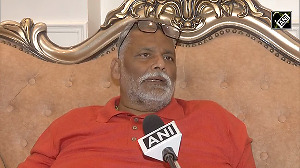P V Narasimha Rao faced the biggest crisis of his prime ministerial tenure, indeed his entire political career, after December 6, 1992, the day the Babri Masjid was demolished.
He was accused of taking an afternoon nap in Delhi when Hindu zealots defied court orders and brought down the disputed structure in Ayodhya.
| |||||||||||
He undertook a massive effort, officially and unofficially, to contact the who's who of the Muslim community in India and assuage their hurt feelings. He had formed a team to undertake this effort.
He prepared a 15-point programme to pacify, cajole and convince Muslim leaders, mullahs and imams to have faith in his government, in India's democratic values and secular values.
According to people involved in that effort, huge funds had been earmarked for development works aimed at the Muslim community.
The next three years saw him making many promises to Muslim leaders.
Before the demolition, he had got Parliament to pass a special law called the Places of Worship (Special Provisions) Act, 1991.
It prohibits conversion of 'any place of worship of any religious denomination into a place of worship of a different religion' and provides for the 'preservation of the religious nature of places of worship as they existed at the time of Independence.'
However, an exception was made of the Babri Masjid and kept out of its purview.
In 1993, he addressed 8,000 imams at a conference in Delhi. He launched the Minority Development Finance Corporation with Rs 500 crore.
He gave in to the demands of managers of Waqf boards, which collectively controlled properties worth Rs 30,000 crore, for changes in the Act governing them. Among other things, the changes enabled them to use their property for community welfare purposes.
Madrasas were given a special grant by the human resources development ministry for 'learning Urdu through computers programmes.' The practice continues till today. Also, mullahs began getting a salary from school managements that received funds from the government.
Personally, Rao was considered above narrow communal politics and was not known to see India from the prism of Hindu-Muslim relations. But opponents did try to tarnish his image by alleging that the Babri Masjid demolition had his tacit consent.
Rao sent confusing signals because he was considered a highly rational administrator, but was often seen deeply engaged in religious rituals.
He regularly arranged pujas and yagnas at his home with the help of his friend Pandit N K Sharma and confidante Chandraswami. Sharma was always present when Rao was negotiating with Muslim leaders after the Babri Masjid demolition.
The general perception was that Rao was a deep believer of Vedic philosophy. "For Narasimha Rao, the word secular was too small," says Sharma.





